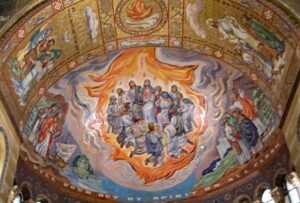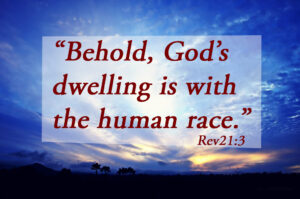“The word of the LORD came to Jonah, saying: ‘Set out for the great city of Nineveh, and announce to it the message that I will tell you.’ So Jonah made ready and went to Nineveh, according to the LORD’S bidding. . . . Jonah began his journey through the city, and had gone but a single day’s walk announcing, ‘Forty days more and Nineveh shall be destroyed,’ when the people of Nineveh believed God; they proclaimed a fast and all of them, great and small, put on sackcloth.
“When God saw by their actions how they turned from their evil way, he repented of the evil that he had threatened to do to them; he did not carry it out.” Jonah 3:1-5, 10
This First Reading (Third Sunday in Ordinary Time) is a small section of the Book of Jonah which, among other themes, brings to our consciousness God’s love not only for Israel, but also for Israel’s enemy, the people of “Nineveh, the capital of the hated Assyrian empire, the home of the people who had destroyed the Northern Kingdom of Israel and the ten tribes of Israel in 722, dispersing those ten tribes forever, the nation that had then laid siege to Jerusalem and exacted tribute from Judah for many years — that God cared for the Ninevites must have been startling to Jonah and the Israelites.”[i] (Dr. Christine Hayes, quoted here and below, is the Robert F. and Patricia Ross Weis Professor of Religious Studies at Yale University and the instructor of the 24-session Yale free online course that our parish Bible Study class has recently completed and thoroughly enjoyed.)
Jonah is a reluctant prophet, perhaps more reluctant about that than we are. He goes as fast as he can in the opposite direction, only to be returned by God to the place of his calling. He goes to Nineveh and speaks God’s message: Repent. The Ninevites do, and God forgives and washes away their guilt, which makes Jonah angry with God because Jonah wanted them to be punished for what they did to his temple and his people. For Jonah, like many of the Old Testament Israelites, “delighted in fantasies of the destruction of Israel’s enemies.”[ii]
Consider this: Who are my enemies, the people I don’t agree with, the people whom I would hope God isn’t calling me to care about enough to want them, along with me and my like-minded friends, to experience God’s love and forgiveness?
Dr. Hayes continues,
“How could Yahweh not be compassionate? For even the most evil of peoples are no less his creation that he has cared for, than precious Israel. And if they will only turn to him in humility, he’ll wipe the slate clean, he’ll show compassion and forgive. It is only human to long for the punishment of the wicked. But God longs for their re-formation, their turning. . . . The book of Jonah reminded Israel that the universal God is desirous of the re-formation and the turning of all his creation, human and animal. And the book of Jonah proposes that the Israelite prophet is called upon to carry a message of divine forgiveness to other nations, not a message of just judgment, and even carry it to those that have humiliated and despised God’s chosen.”
I am quite sure that God is calling each of us to speak the truth to each other, even to those whom we, being human, tend to label as the enemy. The real enemy is ourselves when we allow ourselves to judge each other, to label each other and run away to what we think is the safety of those who think like us. So, let’s find the time to reflect on the story of Jonah and other stories that lead us to needed re-formation. Before reflecting, take time to remember that you are in the presence of our ever-present God and in the presence of Jesus and, possibly, of those of the Communion of Saints you have had the good fortune of knowing.
Here is a link to Dr. Hayes’ lecture. The 11-minute Chapter 2 section on the Book of Jonah begins at 9:29.
Sister Loretta
[i] Lecture 24 – Alternative Visions: Esther, Ruth, and Jonah, Introduction to the Old Testament (Hebrew Bible), Christine Hayes, PhD
[ii] Ibid.




